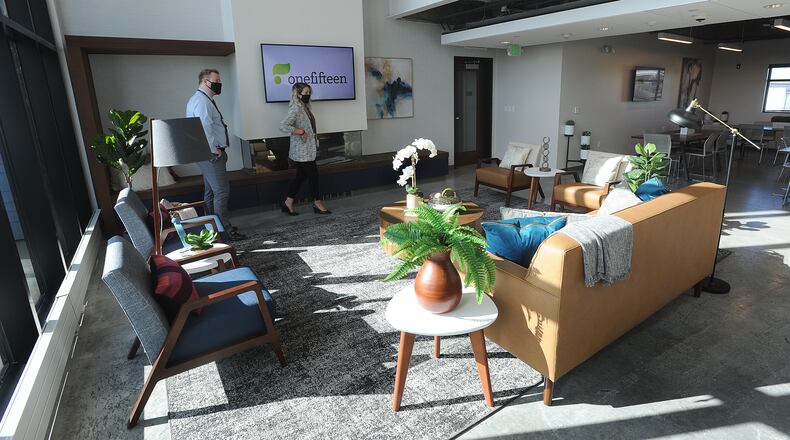Patients reach critical moments during transitions, such as leaving the hospital after being stabilized or moving from intense care to less intensive treatment. The OneFifteen campus is supposed to help prevent risk of relapse during these moments by making transitions smooth and under one umbrella.
Helen Jones-Kelley of Montgomery County Alcohol, Drug Addiction and Mental Health Services, said OneFifteen fills many gaps in care, provides complete treatment and after care, and gives people “not only a bridge back not just to sobriety but to sustainability.”
OneFifteen already has crisis stabilization and detox service, which offers an alternative to the ER, and also has an outpatient treatment center. Now the campus has housing for people who need a supportive place to live while trying to get the pieces in place for sustained sobriety.
Dayton was an epicenter of opioid deaths during the height of the opioid crisis, when 566 people died from accidental overdose deaths in Montgomery County. Through intensive local prevention and treatment efforts, deaths slowed and there were 289 and 285 fatalities in 2018 and 2019, respectively. There have been 237 opioid overdose deaths so far this year, and health officials have warned of concerns of rising ODs during the pandemic.
The new 26,300-square-foot building that OneFifteeen recently held a ribbon cutting for has 29 double-occupancy rooms with separate living spaces for men and women, group kitchens, a fitness center, meditation room, coffee bar and rooms for individual and group therapy. They are still developing the outdoor space.
“OneFifteen Living will give people a safe place to live while they continue their journey of recovery,” said President and CEO Marti Taylor.
Project organizers have said they want OneFifteen to bring the spotlight to the community as a new model for recovery to be replicated. OneFifteen organizers describe it as a tech-enabled learning campus where providers can keep gathering data and honing in on what works and doesn’t work with treatment and recovery.
The new facility is in the Carillon neighborhood, in west Dayton near the former St. Elizabeth hospital.
Gwen Buchanan, president of the Carillon Civic Council, said the Carillon neighborhood group has been involved with the project since in 2018, when the neighborhood group was invited to the table with the project organizers. She said while Carillon Civic Council was not readily accepting of the project, OneFifteen has done what they committed to do.
“We have been at the table. ... if you’re not at the table, people are planning for you. but when you are at the table, they are planning with you,” Buchanan siad.
She said Carillon is excited to have OneFifteen as a partner and neighbor.
“This facility makes everyone feel worthy and valued and that is part of the foundation for resiliency,” Buchanan said.
About the Author
